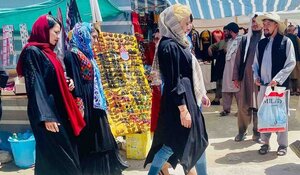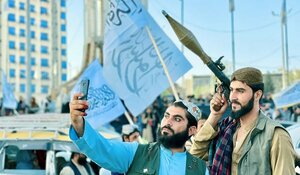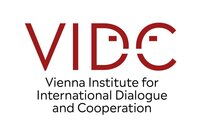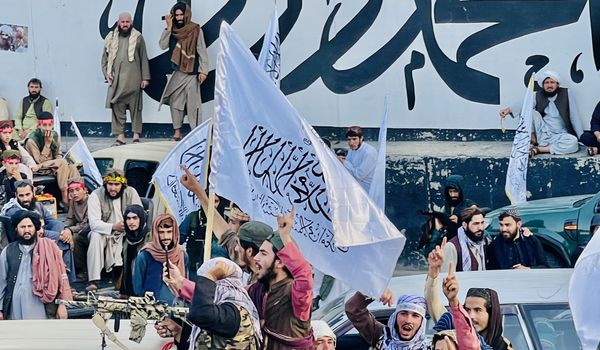In February 2020, the Taliban and the United States government signed the Doha Agreement in Qatar. This agreement had a significant impact on the war and political situation in Afghanistan. The Taliban carried out more attacks in various regions of Afghanistan, and in August 2021, they made astonishing advances, capturing strategic cities within weeks, and approaching Kabul. This turn of events shocked everyone, as Afghanistan, with the support of the United States and its allies, had been defending these cities and villages for twenty years. The peace negotiations, which had been ongoing for two years, were halted, and the morale of the Afghan military plummeted. President Ashraf Ghani’s escape from Kabul marked the end of the republic in Afghanistan, and the Taliban took control of the presidential palace, known as the “Arg,” without facing any resistance or violence. The occupation of the Arg — a symbol of political power in Afghanistan — by Taliban militants was a significant moment. As an expert who has been involved with academic institutions, analytical bodies, think tanks, civil society organizations, and some government structures in Afghanistan for the past twenty years, I was astonished by the events unfolding in the country.
Citizens rushed into Kabul International Airport (KIA), which was the sole means of escaping the crisis. In fear of the Taliban, thousands fled toward the borders of Iran and Pakistan. Afghanistan had transformed into a horrific place, leaving everyone desperate to escape the Taliban-created hell. In particular, youths who had taken control of KIA clung to American military airplanes in their attempt to flee Afghanistan. The scenes witnessed at KIA were deemed the most disturbing in history. Tragically, four young individuals who had grasped onto a US military aircraft fell from a height of 400 meters, resulting in their bodies becoming mutilated. These were harrowing and authentic scenes portraying Afghanistan’s capture by the most terrifying terrorist group.

“Islamic Emirate”: Restrictive Leadership Structure
On 24 August 2021, the Taliban announced their cabinet. In contrast to what they had promised, the cabinet consisted entirely of men. Ninety-six percent of the cabinet belonged to one ethnic group, namely the Pashtuns, to whom the Taliban claimed allegiance. The cabinet was composed exclusively of mullahs and the spiritual leaders of the Taliban. The republican system was abolished and replaced by the Islamic Emirate that suspended the constitution, eradicated the Attorney General’s office from the judicial system, and substituted the Supreme Court with Islamic courts. Parliament was dissolved, and its members fled. Mullah Hibatullah Akhundzada was appointed leader of the Islamic Emirate of Afghanistan, assuming the title of Amir al-Mu’minin, the leader of Muslims. Although he has not been seen since, it has been reported that he resides in Kandahar. People have only heard his voice on the radio, where he speaks with severity and seriousness, issuing orders and edicts to regulate his regime and people’s life.
Kandahar, the city where the Taliban first emerged in 1992, was established as the residence and decision-making center of the Taliban leader, replacing Kabul. The Taliban cabinet remains in Kabul and consists of a prime minister, three deputies, and an extensive administrative and supervisory apparatus. However, all significant decisions stem from Kandahar. The political structure of the Islamic Emirate is based on Sharia law, which imposes severe limitations on citizens. Obedience to the Amir is prioritized in the political structure of Talibanism, and any dissent or political criticism has become intolerable. Mullahs and other influential Sunni religious figures now lead all crucial political structures within the Islamic Emirate.

Two Years under the Taliban: Women’s Rights, Tactics, and Global Ties
The past two years have been extremely challenging for the people of Afghanistan, especially women. According to the “Feminist Majority Foundation” the Taliban have issued over 100 edicts/orders/directives from August 2021 until August 2023 stripping Afghan women and girls of their most basic human rights and opportunities, effectively putting them under house arrest. Girls are no longer allowed to continue their education past the sixth grade, and universities are forbidden from admitting women. Women are prohibited from working and attending recreational areas and welfare centers, and all women’s beauty salons have been closed, effectively eliminating women from society. Numerous restrictions have also been imposed on civil and political rights, including freedom of expression, freedom of the media, and freedom of association. Expressing beliefs other than those imposed by the Taliban is punishable by death, and most independent media outlets have been shut down.
Have the Taliban changed compared to their previous rule in 1990? In my opinion, the Taliban have not changed their nature. Extremist ideology, rooted in Talibanism, has remained unchanged. The Taliban’s stance on human rights, particularly women’s rights, has not changed, and they continue to suppress public opinion in the same manner as before. However, the Taliban have modified their methods and tactics. Previously, the Taliban leadership viewed the media as adversaries, but they have since appeared in the media to communicate their orders and thoughts. Over the past two decades, the Taliban have adjusted their foreign policy tactics, learning how to negotiate and exploit the international community. The children of the older generation of Taliban leaders have taken the lead. For instance, Mullah Yaqub, the son of the late Taliban leader Mullah Omar, now serves as Minister of Defense in Kabul. Moreover, Mullah Sirajuddin Haqqani, the son of Jalaluddin Haqqani, is the Minister of the Interior. The reality is that the Taliban have become more knowledgeable and dangerous by adopting new methods and tactics. However, their fundamental nature remains unchanged.
Do the Taliban have strong ties with global terrorism, particularly Al-Qaeda? The Taliban cannot sustain themselves without the support of global terrorism. Global terrorism serves as one of their intellectual and economic resources. The Taliban exercise complete control over the border regions between Afghanistan and Pakistan, which has prevented international monitoring bodies from accessing them and has allowed the Taliban to easily recruit and collaborate with global terrorists. Additionally, they have managed to garner support, especially from the United States, under the pretext of combating terrorism in the region. Consequently, some countries openly engage with the Taliban. Russia and Iran have handed over the Afghan embassies in Tehran and Moscow to the Taliban, and some Middle Eastern and Central Asian countries, as well as Pakistan, continue to have official dealings with the Taliban, thus disregarding the decisions of the United Nations Security Council.

Charting a Path to Afghanistan’s Stability: A Global Responsibility
Regrettably, the Taliban have gained control over all aspects of Afghanistan’s political, social, and economic life and are steadily expanding their power in the country. Despite this, there is a lack of national and international recognition of the Islamic Emirate, which obstructs international aid organizations’ access to the impoverished population of Afghanistan and exacerbates prevalent poverty in the country. The truth is that the Taliban have taken the people of Afghanistan hostage. The lack of global coordination regarding the situation in Afghanistan has had adverse consequences. The conflict in Ukraine has drawn attention from the international community. Furthermore, the war has also caused fragmentation within the global community.
In my opinion, Afghanistan relies heavily on the role of the international community. As long as the international community fails to take a coordinated approach to handling the Taliban, stability will persist in the Taliban’s Islamic Emirate in Afghanistan, and the people’s problems will intensify. Another issue lies in the absence of a genuine political alternative to the Taliban within the country. People no longer trust failed politicians, which necessitates the emergence of new ideas, politicians, and leaders. Consequently, the global community must support a new political agenda that aligns with Afghanistan’s internal and external realities (21 September 2023).

